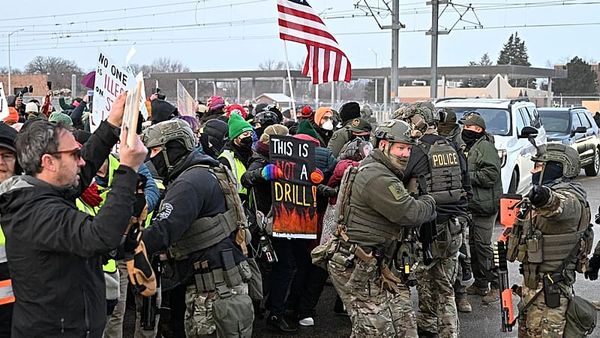
The US supreme court “erred badly” in ruling Colorado was wrong to seek to remove Donald Trump from the ballot for inciting the January 6 insurrection, a leading historian and analyst of presidential politics said.
The court handed down its unanimous ruling on Monday, a day before Colorado became one of 16 states and one US territory to hold a Super Tuesday primary.
“The supreme court erred badly based on our amicus brief and our review of history, in claiming that a candidate for federal office can only be disqualified by an act of Congress,” Allan Lichtman said, speaking to reporters with three other historians who signed the brief arguing Trump should be removed.
Lichtman is a professor at American University in Washington DC who has correctly predicted the outcome of every presidential election since 1984, using a system of “keys to the White House” he co-devised.
With Trump closing on the Republican nomination, Lichtman recently said Joe Biden held five keys to Trump’s three, with five up for grabs.
Most analysts and pollsters give Trump the edge, despite his facing 91 criminal charges (17 for election subversion, 40 for retention of classified documents and 34 over hush-money payments to an adult film star) and suffering multimillion-dollar penalties in civil suits regarding his business affairs and a rape allegation a judge called “substantially true”.
But with Colorado’s attempt to remove Trump from the ballot rejected by the supreme court – ensuring the same fate for efforts in Maine and Illinois – he is poised to secure the Republican nomination and potentially return to office.
The Colorado case attracted numerous amicus briefs. Lichtman and 24 other historians argued Trump should be disqualified under section three of the 14th amendment, approved in 1868 to bar former Confederates from office.
“For historians,” they said, “contemporary evidence from the decision-makers who sponsored, backed and voted for the 14th amendment … demonstrates that decision-makers crafted section three to cover the president and to create an enduring check on insurrection, requiring no additional action from Congress.”
On Monday the supreme court disagreed, saying in an unsigned opinion: “We conclude that states may disqualify persons holding or attempting to hold state office. But states have no power under the constitution to enforce section three with respect to federal offices, especially the presidency.”
It was up to Congress, five of the six conservative justices said, to enact disqualification procedures.
Lichtman spoke to reporters with three other signatories to the amicus brief: Manisha Sinha, of the University of Connecticut; Brooks D Simpson of Arizona State University; and Orville Vernon Burton, of the University of Illinois.
Lichtman said the brief “decisively proved [that] not a single one of the thousands of ex-Confederates who were disqualified under section three of the 14th amendment were disqualified under an act of Congress. They were automatically disqualified, as Jefferson Davis himself [the former Confederate president] recognised in his trial and the two judges in the trial agreed.”
Lichtman said he identified some good in the Colorado ruling. First, the court “did not buy into Trump’s argument that section three of the 14th amendment excluded the presidency” as an office subject to sanction.
“Secondly, the supreme court, consistent with our brief, did not buy into the argument that section three only applied to ex-Confederates – clearly in this ruling [the court] indicated that it applies indefinitely.
“So these positive aspects [warn] future insurrectionists that you will not necessarily get away scot free. You can be disqualified by the states if you try to run for a state office, and you can be disqualified to run for a federal office by an act of Congress.”
Like Lichtman, Sinha noted that the four women on the court – the liberals Elena Kagan, Sonia Sotomayor and Ketanji Brown Jackson and Amy Coney Barrett, a conservative – issued something of a rejoinder to the five men, saying they went too far by stating only Congress could disqualify a candidate for federal office.
But Sinha said the ruling left her “a little more pessimistic”. Speaking ironically, she said: “Let me congratulate the conservatives for giving up on their deep respect for states’ rights that they have always showed in their decisions but strangely enough in this particular decision they upheld the federal and national authority of the 14th amendment. So that was quite out of character.”
The liberals who agreed there should not be a “patchwork” state-based system of disqualification, Sinha said, “don’t seem to understand that if the supreme court had rendered a decision disqualifying Trump that would have had a national effect, it would not have meant that each state gets to decide. The decision as it stands now has a national effect: that Trump cannot be barred from any states.”
Trump appointed three rightwingers to a court critics accuse of acting in his favour: speedily dismissing the Colorado challenge but moving slowly on Trump’s claim of total immunity in his federal election subversion case.
In that case, the court said last week it would hear arguments on a matter most thought decided against Trump by a federal appeals court. Trial will now take place close to election day in November or after it, giving Trump the chance to dismiss the charges should he return to power.
Sinha said: “It seems to me that [the court] fast track[s] all the decisions in all the cases that let Trump off the hook and they’re slow-pedaling all the decisions that don’t let Trump off the hook.
“This is primary season and I think it’s going to have an effect politically. Trump is going to seal the deal” with the Colorado decision.
Simpson said he was less disappointed in the decision, because it “illuminates certain ways in which Trump is still vulnerable”, including by not addressing the question of whether he incited an insurrection.
“The crisis persists,” Simpson said, “and anyone who sees this as a definitive ruling that settles everything is sorely mistaken.”







